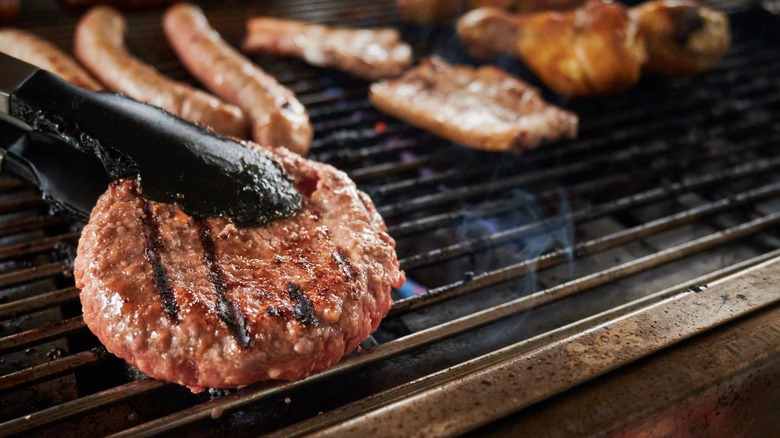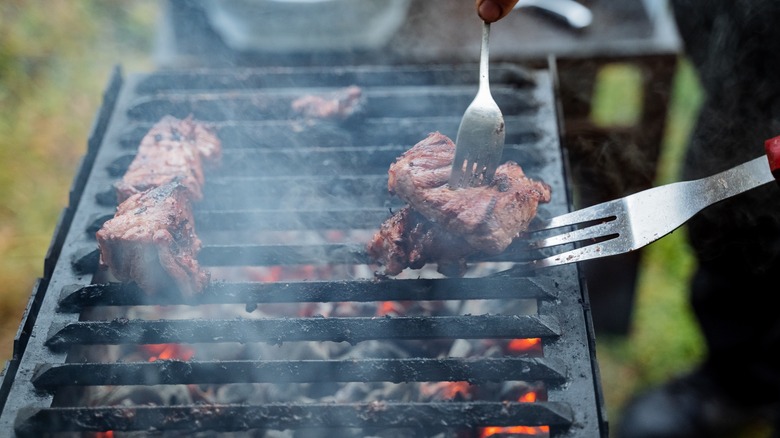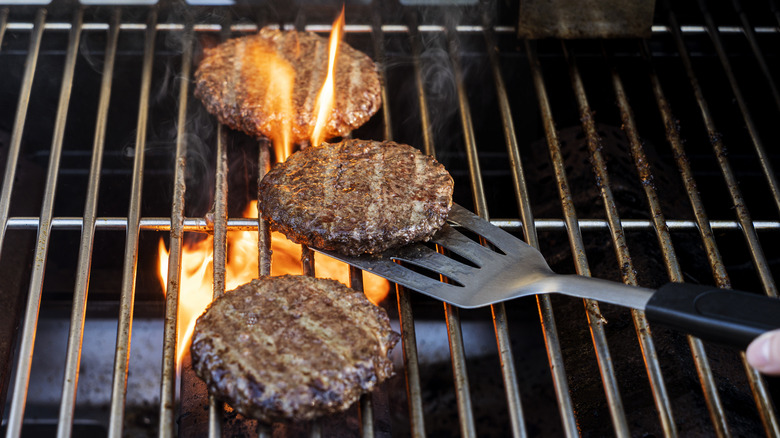You Need To Stop Flipping Food On The Grill With A Fork Immediately
Behind every grilled feast is a lot of practice, patience, and know-how. But whether you're cooking homemade burger patties or searing prized steaks, one grilling technique stands out in importance: knowing how to flip the food. Flipping ensures that whatever you're grilling will be cooked evenly to perfection on both sides ... but watch out for the tool you use for the job. Specifically, you don't want to use a fork.
Often, novice grillers pick up a fork as a flipper out of sheer convenience. There's bound to be one lying around if you're hosting a backyard party, and maybe you can use it to sneak a few bites in, too. But the sharp tines of a fork can puncture the food and let some of the juices out — the exact opposite of what you'd want for a good piece of grilled protein.
Instead of a fork, it's safer to use a pair of barbecue tongs. Most tongs of this type don't have sharp ends, so they won't damage the meat. Do note, however, that it's not a guarantee your food will come out perfectly just because you use tongs. The heat, the cooking time, and the quality of the ingredients will be the decisive factors — it's just that you'll have one less variable to worry about when you pick a good flipping tool.
Using a fork to flip steak won't completely destroy the meat
While the fork isn't the best tool to use for flipping most grilled foods, using one to flip your grilled steak once or twice probably won't hurt. It's true that a bit of the steak's moisture will leak from the fork's punctures, but the juice within a steak is distributed thinly across the whole cut.
Imagine a steak as having many different compartments, each holding a tiny bit of moisture. When you take a fork and spear it, you'll bust open a few of these compartments, and the moisture they contain will escape. However, all the other parts of the steak won't be affected and will still be juicy as normal. Because of this, unless you riddle the cut with punctures, the chance of the meat becoming so dried out that you'd be able to taste the difference is very small. Nevertheless, if you want to give your food the best conditions to grill in, it's safer for your pricey ribeye steak to have zero holes in it — a job that tongs can do for you.
No tongs? No worries!
If you don't have a pair of tongs handy, there are plenty of other non-stabby tools that you can use in place of a fork. A spatula, for instance, is a great candidate. However, since it only lifts the bottom of the food, you may have to gently press the meat against the spatula with your fingers so that it won't fall and bounce off the grate mid-flip.
And in case you're in a pinch but are adamant about not using a fork, just take two spoons and use them like a pair of hingeless tongs. Put one on top of the meat and one at the bottom. Press them tightly together to grip, flip your wrists, and voilà!
The odds of you grilling without a pair of tongs or a spatula nearby are small, though (or so we'd hope). You'll likely never have to resort to the desperate spoon trick. In that case, it's just easier to use a fork. Your steak should be safe as long as you don't make a habit out of it.


